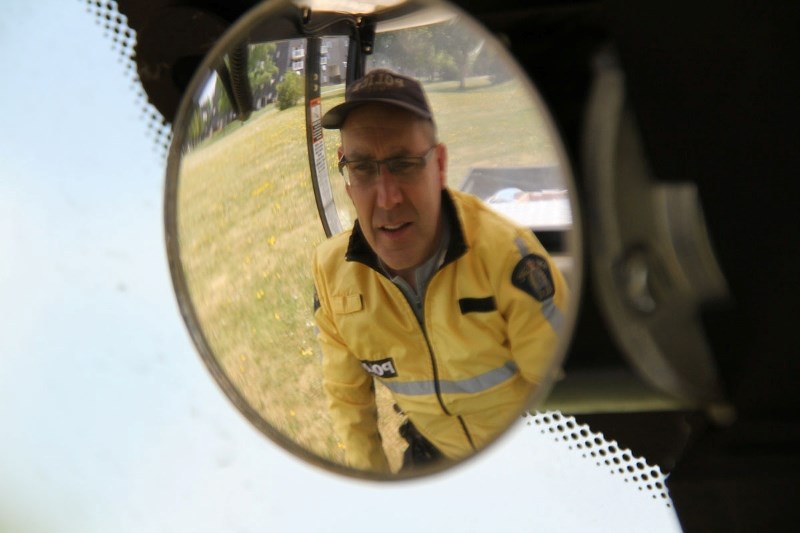The girl pretends not to see us. She sits cross-legged on the grass, red hair tucked under a colourful Bob Marley hat in 20-plus degrees weather.
When the RCMP golf cart stops right beside her she looks up, grimaces and takes off her headphones. Const. Geoff McKay smiles.
"Hi," he says.
"Hey, man," she replies.
He tells her his name and asks about the weather. They talk about her colourful headwear, and what she's doing out here in the middle of the day. She walked quite a ways and is heading to school, she says. Now she's "taking a break."
She shuffles around and starts packing some items into her bag. McKay says she's pretty close to school.
"Yeah," she says.
When he's satisfied with the conversation, he drives away. The electric cart hums up the sidewalk before turning onto a trail. It's lunchtime at the schools. Time to talk to the students.
Presence in the parks
McKay ended his retirement with the RCMP about four years ago to join the community policing team as a reservist.
Aside from working with organizations such as Family and Community Support Services, youth programs and block parties, community officers often walk, cycle and drive city streets to stay in touch with residents.
After complaints of noise and youth partying arose along the city's trail system, the RCMP acquired an electric patrol vehicle, a fancy kind of golf cart. McKay, who also works with youth in the schools, now drives it through the city in the summer. I joined him for a day.
"I think it cut down on the vandalism quite a bit by having a presence in the parks," he tells me, as we roll through a wooded area close to the river.
In a clearing between the trees, cigarette butts litter the ground by a fallen tree trunk. Someone sprayed their initials in big white letters on a building wall nearby. He takes a photo of it. There's other graffiti on the wall but this one is new, he says.
We later drive into another clearing, somewhere else in the city. This one is next to a playground and sometimes he runs into youth smoking marijuana here, he says.
What happens if he catches them, I ask.
"I usually take them back and turn them over to the principal. Sometimes I charge them. I tell their parents," he says.
Talking to youth
A group of students sits on a bench near Paul Kane High School. They already know "Mr. McKay," and peek into the back of his cart. He keeps a small stock of canned soups, chips and chocolate bars there. Some of it he gives to the students. The soup goes to homeless people he meets, or less fortunate youth.
They talk about old movies, jobs, and why someone's brother isn't calling their probation worker. Some of the students are smoking, so the discussion shifts to the cost of cigarette packs and health care for smokers.
"You should have an addiction to exercise … or just going to class," says McKay.
At another school, he reports two girls to the principal. They were sitting at a picnic table during school hours and got creative with their last names. Most of the students are nice to him, though. They talk about their future with him, or introduce their girlfriends.
Does it prevent crime when he gets to know the youth around town, I ask. Sometimes they tell him about things, he says.
We drive into the neighbourhoods now, on sidewalks and trails. I lose all sense of direction as we hop from boardwalk to boardwalk. But McKay knows his route by heart.
He tells me about different homes and their residents. Often, he stops to chat with people, to ask about their day or talk about his job. He calls it old-fashioned policing.
"Only it's in the parks," he says.
The battery signal on the electric cart is running low after a few hours of driving. We've gone all over St. Albert, checked on the Children's Festival, crossed the river several times and raced down Seven Hills.
The golf cart drives through areas no police car ever goes to, he says. He can get behind the schools, where youth hang out and smoke, or drive through the woods to hidden areas many residents don't even know about. He knows the homeless and residents alike, and builds relationships throughout the community.
Not every officer would want this job, he says. Some like it closer to the action. But when you hand out tickets, or check on a 911 call, you don't have much time to talk to the people.
"I love doing it," he says. "You're outside, it's sunny, you are talking to people, get to know everything in the community."




